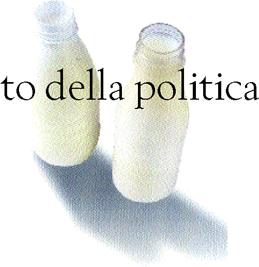| |  | | Più peso in sede politica. È questa l’istanza emersa dall’ultima assemblea generale dei trasformatori di materie plastiche. Che mostrano una rinnovata attenzione alle istituzioni e alla gestione dell’ambiente, ma anche alla certificazione di Qualità, incentivata con iniziative concrete.
E.P.
| | |  | |  |  |  | Il nuovo presidente di Unionplast si chiama Franco Muscarà. Siciliano di origine, lavora da sempre a Roma e in passato è stato presidente del Comitato Piccola Industria nonché vice presidente Confindustria. «Insomma, un uomo politico, a cui i produttori di manufatti di plastica hanno conferito un incarico di rilievo: far valere nelle sedi istituzionali il ruolo che i converter vanno assumendo nella compagine nazionale, anche considerato che il segmento delle materie prime è stato progressivamente assorbito - fatte le debite eccezioni - dai grandi gruppi stranieri».
Così Angelo Bonsignori, direttore di Unionplast (oltre 5.000 imprese rappresentate, 135.000 dipendenti e 32.000 miliardi di fatturato) commenta l’inizio del “dopo Foggini”, salutato con il meritato affetto alla scadenza del mandato.
E dell’impegnativa missione il neoeletto presidente si fa pienamente carico nel discorso di investitura, sottolineando come «essere parte della Giunta confederale consenta di attivare relazioni utili alla tutela degli interessi di un settore, di rimettere in prima linea grandi temi strategici come la tutela dell’ambiente, di frequentare i colleghi che rappresentano gli altri materiali e i settori di sbocco del comparto. Oltre che percepire “rumori e umori” utili a guidare un’associazione».
Muscarà richiama anche l’attenzione sulla congiuntura favorevole che si è creata negli ultimi mesi per i converter della plastica, dato che alla presidenza di Corepla è giunto, come da Statuto, un imprenditore della trasformazione, ovvero Lorenzo Sabbion, così come alla vice presidenza dell’Istituto Italiano dei Plastici (di recente riformato proprio per consentire ai converter di esprimere un numero di amministratori coerente con il reale peso nel mercato della Qualità) e ai vertici del Fondo Gomma Plastica, istituito per favorire il ricorso a sistemi previdenziali privati.
Ambiente e Qualità nel futuro prossimo
Fra gli orientamenti emersi durante l’assemblea del 30 maggio, spiccano almeno altri due i punti programmatici di rilievo.
«Innanzitutto - sintetizza Bonsignori - occorre valorizzare ulteriormente quella straordinaria risorsa che è il Corepla, finanziata con un patrimonio consistente (il contributo ambientale versato dalla plastica ammonta a 240 miliardi di lire) e responsabile di obiettivi di portata strategica (stimolare, sostenere e gestire il recupero e il riciclo degli scarti di imballaggio). Fra le priorità in questo campo si pongono la messa a punto definitiva di forme di valorizzazione alternative al riciclo meccanico, soprattutto relative allo smaltimento termico, e la parallela azione di informazione dei cittadini - in cui Corepla eccelle - sul contributo di civiltà e benessere che questo comporta. In altre parole, mentre in Francia la termovalorizzazione dei rifiuti è considerata un’opportunità, in Italia è vissuta ancora come un pericolo, nonostante la tecnologia allo stato dell’arte e, in molti casi, la maggiore razionalità ambientale di questa forma di smaltimento rispetto ad altre».
Al riguardo, Muscarà ha sottolineato come i buoni risultati del riciclo meccanico siano stati in larga misura favoriti dagli alti prezzi delle materie prime vergini, e che quindi sia indispensabile dotarsi degli strumenti necessari per raggiungere gli obiettivi di smaltimento anche in congiunture diverse. E ha anche accennato all’opportunità, agevolata dai recenti cambi ai vertici istituzionali e di governo, di favorire un rapporto più disteso con le altre istituzioni a vario titolo coinvolte nella gestione dell’ambiente - dai ministeri al Conai, passando per l’Osservatorio - in modo da poter lavorare meglio insieme in vista degli imminenti appuntamenti comunitari (revisione della Direttiva in primis).
Il secondo appuntamento ideale, ricorda Bonsignori, è quello con la Qualità, su cui anche Muscarà si è soffermato a lungo. Intento di Unionplast al riguardo è di promuovere con efficacia e tempestività lo sviluppo di un sistema di Qualità integrato, in grado cioè di certificare al contempo la qualità di prodotto, di processo e ambientale, a un costo sostenibile e seguendo procedure razionali e trasparenti.
«L’obiettivo ultimo - spiega il direttore di Unionplast - è di approntare uno strumento utile a stimolare il progresso del settore e a documentarne i livelli di eccellenza raggiunti, nonché la conformità alle leggi dell’operare delle aziende. Con la collaborazione dell’Istituto Italiano dei Plastici sarà più facile raggiungerlo in tempi brevi e a costi competitivi per gli associati». |  | Converters: the moment of politics
Pull more weight on the political side of things. This is the point that emerged from the last general assembly of plastics converters. New interest in the institutions and the environmental question, but also Quality certification incentivated with concrete undertakings.
«The new president of Unionplast is Franco Muscarà. Of Sicilian origin, he has always worked in Rome and in the past was president of the Small Enterprises Committee as well as vice president of Confindustria. Thus you could call him a politician, to whom the producers of plastic manufactured items have assigned an important task: to assert the role that the converters are taking on at a national level with the institutions, also considering the fact that - with due exceptions - the raw material segment is being steadily absorbed by the large foreign groups».
This was how Angelo Bonsignori, head of Unionplast (over 5,000 companies represented, 135,000 employees and 32,000 billion of turnover) commented the beginning of the “post Foggini” era, the former president receiving a magnificent send-off as his mandate ran out.
And in his speech of investiture the newly elected president firmly accepted all the commitments his new role entails, underlining how «being part of the confederal council will enable him to cultivate relations useful for safeguarding sector interests, meaning here promoting strategic questions like environmental protection, as well as keeping up contact with the colleagues that represent other materials and the segment outlet sectors. Muscarà also declared he would be in a position to pick up the “rumours, hearsay and the general mood of things”, useful in guiding an association».
He also draws attention to the favourable market situation that has been created over the last months by the plastics converters, given that, as laid down in the Statute, the presidency has gone to an entrepreneur from the converting sector, this being Lorenzo Sabbion, the same going for the vice presidency of the “Istituto Italiano dei Plastici” (recently reformed so as to allow the converters to be represented by number of administrators in line with the real weight of the Quality market) and the top management of the Fondo Gomma Plastica (Plastic and Rubber Fund), Instituted in order to favour the resorting to private insurance systems.
Environment and Quality in the near future
Among the tendencies that emerged during the assembly held on the 30 May, at least two other key program points stand out.
«Aboveall - Bonsignori sums up - one has to make even better use of that extraordinary resource called Corepla, financed by consistent funds (the environmental levy paid in by plastics totals 240 billion lire) and responsible for objectives of a strategic importance (to stimulate, support and administer the recovery and recycling of packaging waste). Among the priorities in this field one has the definitive creation of alternative forms of exploitation to mechanical recycling, aboveall involving thermal disposal, and a parallel campaign to inform the public - something that Corepla excels at - as to the related social advantages as well as those concerning public health and well-being. In other words, while in France the thermal regeneration of waste is considered an opportunity, in Italy it is still seen as a danger, despite state-of-the-art technology and in many cases, the greater environmental plausibility of this form of disposal compared to others».
On this count, Muscarà has underlined how the good results from mechanical recycling have to a greater degree been favoured by the high prices of virgin raw materials, and hence it is indispensable to also fit oneself out with the tools needed for attaining disposal objectives in different market situations. And he also made mention of the opportunity, made easier by the recent changes at the top of institutions and of the government, for favouring a relaxed relationship with other institutions that in various degrees are involved in administering the environment - from the ministries to Conai, going by way of the Observatory - so as to be able to work better together in view of impending EC commitments (revision of the Directive first and foremost.
The second challenge to be met, Bonsignori reminds us, is that of Quality, of which Muscarà also spoke a lot. Unionplast’s intention on this count is to effectively and speedily promote the development of an integrated Quality system, capable that is of certifying the product, the process and environmental quality at the same time at a sustainable cost, while following rational transparent procedures.
«The ultimate objective - the head of Unionplast explains - is to prepare a tool useful for stimulating the progress of the sector and document the levels of excellence achieved, as well as the conformity to the laws governing the way enterprises operate. With the cooperation of the Istituto Italiano dei Plastici, achieving the same in a short period of time and at competitive costs for the members will be easier». | |